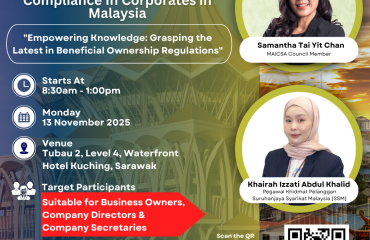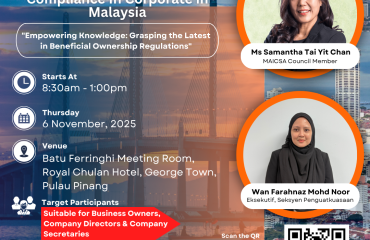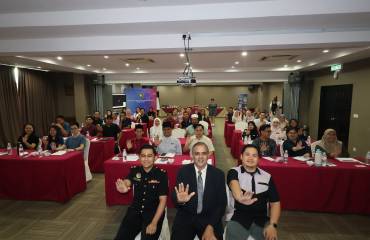Transparency International Malaysia (TI-M) would like to thank all Malaysians who have contributed to and supported our collective fight against corruption during this trying and colourful year. Any fight for true justice is incomplete and impossible without the support of the Rakyat.
TI-M would also like to congratulate Tan Sri Abu Kassim for his meritorious career and contribution in the field of anti-corruption. We hope that the journey of the National Anti-Corruption Plan (NACP), conceived under his leadership will continue on as promised by the current PM Tan Sri Muhyiddin Yassin, earlier this year.
As the year winds down to an end TI-M would also like to take stock on the various outcomes, discoveries, surprises and struggles of the year we are leaving behind us.
Early this year all Malaysians were shocked by a sudden change in government triggered by the sudden resignation of ex-Prime Minister, Tun Dr Mahathir Mohamed, which resulted in a democratically elected Pakatan Harapan (PH) government being replaced by a new coalition, Perikatan Nasional, largely populated by the opposition on the eve of an international public health crisis. Later on in the year, as Malaysia was decorated by the WHO for our efforts in combating and containing the pandemic, a similar situation unfolded in Sabah, resulting in the Sabah state elections; which resulted in a second wave of the pandemic escalating to new heights, and a change in the state government.
In terms of the law, TI-M lauds the long overdue Section 17A of the MACC Act 2009 coming into force this year – the provision makes a company (of any size) and its management and directors criminally liable if any of its employees or service providers give bribes for the benefit or advantage of the company. The only defence available to the company is to show that it had adequate procedures to prevent corruption. To complement this new law TI-M urges the government to include the Deferred Prosecution Agreement into this legal provision to allow companies to seek leniency from the government and thus save on government resources and promote restorative justice. Also, with regards to the MACC Act, we saw the first conviction of a case of failure to report corruption being an offence under Section 25(1) of the MACC Act carrying a maximum RM100,000 fine or imprisonment of up to 10 years or both, upon conviction.
TI-M is very disappointed with the withdrawal of the (already watered down) IPCMC Bill which had been promoted by the PH government, and its replacement with the toothless, IPCC Bill proposed by the PN government. The only solution to help improve the operations of the Royal Malaysian Police, reduce widespread corruption and deaths in custody, as well as improving the image of the RMP would be to implement the IPCMC in its original form as recommended by the Royal Commission of Inquiry to Enhance the Operation and Management of the Royal Malaysian Police in 2005.
In terms of enforcement, Malaysia made history with its first conviction of an ex-Prime Minister for corruption, followed by the conviction of the ex-Federal Territories Minister, Tengku Adnan for corruption as well. On the same limb, we were shocked with the Discharge Not Amounting to Acquittals granted to Riza Aziz (in return for returning properties already seized by the Malaysian government) and Tengku Adnan for another corruption charge; both without adequate explanation or reasons given by the Attorney General’s Chambers. Further to that, we were served with acquittals for all of the 46 corruption and money laundering charges against ex-Chief Minister of Sabah, Tan Sri Musa Aman.
TI-M and the public are also awaiting the outcomes of the investigation into the mass graves and human trafficking in Wang Kelian, along with the mysterious instructions given to the police to destroy the graves after its discovery. It has been several years and such a high profile public interest case requires proper closure, especially since Malaysia is in tier 2 of the Trafficking in Persons (TIP) ranking for the third consecutive year. A drop to tier 3 could put us in the same rank with Afghanistan, North Korea and Myanmar. However, there is hope, as TI-M notes the sting operation (Ops Selat) carried out in tandem by the MACC and the Immigration Department which managed to bust a criminal syndicate involved in human trafficking and migrant smuggling with the arrest of 46 suspects, including 27 Immigration Department officers, in several locations including Putrajaya, Selangor, Johor, Sabah and Sarawak. The outcome proves the law enforcement has its ear on the ground, but sadly also points to the complicity of some of its officers with international organised crimes of human trafficking and migrant smuggling.
More recently, we have been ‘served’ with a bitter taste in our mouths of the alleged Halal meat cartels – which serves as a reminder of how corruption, cronyism and abuse of power for profits is not an abstract crime, but one that affects every person on the street directly. For all the clamping down of liquor sales implemented by the government to prove a point, the rot in gatekeeping and the corruption virus has found its way into our food supply and dietary necessities. TI-M hopes that beyond penal action, reforms in the food supply chain to prevent such crimes will be implemented and followed through to prevent such immoral crimes against the Rakyat.
Statistically, Malaysia’s ranking in the Corruption Perceptions Index (CPI) for 2019 jumped 10 places to 51 compared to 61 in 2018. This was largely due to the swift action by the Pakatan Harapan administration in addressing the 1MDB, SRC International, Felda and Tabung Haji scandals when they came into power, followed by the arrest of several political figures who were later charged by the MACC. Other factors which contributed to this increase was greater media freedom, asset declarations and promises of a political financing act and IPCMC act.
This was followed by the Global Corruption Barometer which was released in November this year, which was a survey conducted across Asia between July 2019 and June 2020, covering both the PH and PN administrations. It found that out of those surveyed, 36% felt Members of Parliament to be corrupt, 30% felt the police were corrupt, 28% believed government officials were corrupt, and 39% strongly believed that corruption was on the rise. However, 68% and 67% believed ordinary citizens could make a difference in the fight against corruption, and that the government was doing a good job fighting corruption, respectively.
Several of the NACP initiatives have missed the dateline. A good example is to increase efficiency and transparency in public procurement (Section 3.1.3, NACP) by strengthening the Integrity Pact to be in line with international standard by December 2020. The objective is to have greater transparency and good governance in public procurement which involves tax payers’ money. Unfortunately this has yet to be implemented.
TI-Malaysia urges the government to increase transparency in government spending especially in handling the Covid-19 pandemic and purchase of vaccines and both sides of the political divide to stop money politics and party hopping for enticements which result in instability and undemocratic power. Further we urge law enforcement and regulatory agencies to punish the corrupt without impunity, and the Government to also stop the practice of appointing MPs and elected officials to be in charge of GLCs and Statutory bodies.
Lastly, TI-Malaysia would like to wish all Malaysians a Happy New Year. May we together eradicate the filth and rot of corruption from our beloved nation.
End







